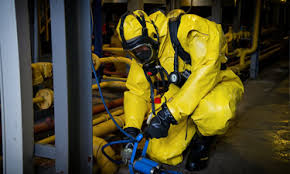
Details
The Role of Radiation Protection Officers (RPOs) in Safety Compliance
Where ionizing radiation is employed, safety and compliance with regulations ought to be the primary concern. At the forefront of spearheading this endeavor lies the responsibility of the Radiation Protection Officer (RPO) or the Radiation Safety Officer (RSO). Their work is ensuring that there is radiation safety programming for the employees, the general population, and the environment as a whole, in an attempt to ensure everyone can be safeguarded against potential exposure to harmful effects of the radiation. Next is the multifaceted role RPOs are asked to perform in adherence to safety, as well as pointing out some of their key responsibilities and just how great an impact what they do has in its coverage across other areas.
Radiation Protection Officer (RPO)
An RPO is a trained expert responsible for overseeing and coordinating the organization's radiation protection program. The main aim is to ensure that all radiation source-related activities conform to relevant safety standards and legislation. RPOs are engaged in the promotion of a safety culture and activities to reduce radiation exposure to as low as reasonably achievable (ALARA).
Main Responsibilities of Radiation Protection Officers
An RPO has a very long list of responsibilities that cover many areas of radiation safety management:
1. Compliance with Regulations
RPOs ensure that the use of radiation sources by the company is in accordance with national and international law. This involves the acquisition of required licenses, adherence to stipulated conditions, and keeping abreast of any changes in the law. In India, for instance, the Atomic Energy (Radiation Protection) Rules, 2004, specify the responsibilities of Radiological Safety Officers in detail, e.g., advising employers on compliance and maintaining standards of safety.
2. Development and Implementation of a Radiation Protection Program
Effective development of a radiation protection program is at the very core of the RPO job. The program consists of controls and policies of radiation exposure control, routine safety inspections, and ongoing improvement efforts. The RPO ensures that protocols are explained effectively and adopted company-wide.
3. Surveillance and Monitoring
Routine monitoring of radiation exposures in the workplace must be provided to detect and avoid overexposures. RPOs monitor the use of dosimeters and other measuring devices to ensure that they are calibrated and used correctly. They review monitoring data for trends and undertake corrective actions when needed.
4. Training and Education
Training of employees in safety handling practices and radiation hazards is one of the key tasks of the RPO. They create training for various job positions in the company so that all employees are well aware of the fundamentals of radiation protection and safety procedures.
5. Emergency Preparedness and Response
Even with protective procedures of the utmost care, radiation accidents are possible. RPOs must prepare emergency action plans to outline arrangements for procedure in several situations, such as spills or uncontrolled exposure. They run periodic practice drills and coordinate with off-site emergency organizations as required.
6. Waste Management
Radioactive waste disposal is downright necessary to prevent environmental contamination and non-compliance with regulations. RPOs oversee the collecting, storing, and disposing stages, maintaining the right records and ensuring all these processes are secure.
7. Liaison with Regulatory Authorities
As a middleperson to the company and the regulatory bodies, RPOs help conduct inspections, report occurrences, and ensure that all the regulatory filings are done in an accurate and timely manner. The relationship is needed in order to keep the company in good standing and up-to-date on matters pertaining to a regulatory perspective.
8. Record Keeping and Reporting
Keeping proper records of radiation sources, exposure levels, training, and safety inspection is at the heart of the work of an RPO. These records serve to prove compliance at inspection as well as providing the information on which to make decisions about the safety practice.
The Work of RPOs in Industries
Radiation Protection Officers play a vital function in industries:
- Healthcare
At hospitals around the globe, RPOs provide protection against the misuse of therapeutic and radiological diagnostic equipment to prevent overexposure of patients and workers. They regulate the running of X-rays, CT scanners, and radiation therapy machines to ensure they are consistent with medical standards.
In nuclear power plants, RPOs provide radiation protection programs to protect workers and the environment. They regulate the level of radiation, establish security protocols, and provide compliance with strict regulatory requirements.
- Industrial Applications
Industrial uses trace the practice of non-destructive testing with the aid of radiography by industries that depend on RPOs for safe working environments. They monitor use of the radioactive source as material and construction inspection is conducted in such a manner that workers' exposure and the general public can be kept to a minimum.
Educational and research environments involving the handling of radioactive materials necessitate RPOs to manage laboratory safety, safe disposal and handling of materials, and adherence to research rules and regulations.
Qualifications and Competencies of an Effective RPO
To become effective in executing their responsibilities, Radiation Protection Officers should have:
- Educational Background
A baccalaureate in health physics, radiological science, or equivalent degree provides the fundamental background necessary to comprehend radiation principles and safety procedures.
- Certification and Training
Professional certification, e.g., by major health physics societies, and comprehensive radiation protection training improve an RPO's proficiency and credibility.
- Analytical Skills
Knowledge of assessing complex situations, interpreting radiation information, and making logical conclusions is essential for successful radiation safety management.
- Communication Skills
Effective communication of technical information to technical and non-technical staff will ensure effective utilization and understanding of the safety procedures by all.
- Attention to Detail
Care and caution in adhering to radiation levels, record keeping, and rule compliance are very important in accident prevention as well as regulation compliance.
Radiation Protection Officers play an imperative part in workplace safety and workplace compliance in places where ionizing radiation is utilized. Their role from regulation compliance to having ready emergency response is instrumental in safeguarding workers and the environment against radiation exposure. Organizations need to acknowledge

